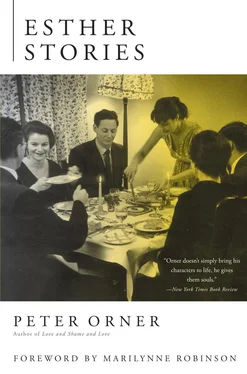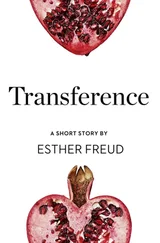“At ease, sailor,” he says, and I kneel down amid the suits and dangling ties and belts. And I see now that it’s not how many times you hear a story but where you hear it that matters. I’ve heard this before, but this is the first time I’ve been in a closet alone with my grandfather.
“Why?” I say. “Why, if you knew it wasn’t—”
“Why?” he says, not as if he’s repeating my question but as if he really doesn’t know. He sighs. Then, still whispering even though we’re in the closet, he says, “Some men would lie to you. They’d say it’s war. I won’t lie to you. It had zero to do with war and everything to do with the uniform I was wearing. Because my job was to make decisions. Besides, what the hell would I have done with a boatload of naked Japanese? There was a war on.”
“But you just said—”
“Listen, my job. Just because men like me made the world safe for men like your father to be cowards doesn’t mean you won’t ever blow up any civilians. Because you will. I do it once a week at the bank.” He places a stumpy, powerful hand on my shoulder. “Comprende?”
“Never,” I breathe. “Good,” he says, and we are standing in the dark and looking at each other, and the story is the same and different — like last time, except this time his tears come so fast they’re like lather. He blows his nose into his hand. I reach and offer him the sleeve of one of his suit jackets. “I’ll let myself out,” he says, and leaves me in the confessional, closing the door behind him.
I don’t imagine anything, not even a hand that feels like a fish yanking my ankle. Another door opens. “Seymour? Seymour?” my grandmother says. “Where’s the kid?”
IT IS EARLY Monday morning on Lunt Avenue, Rogers Park, Chicago. November 1954. Seymour Burman shouts at his son Philip, the boy who will become my father. It is ten before seven and Seymour’s anger smells of Scotch. Philip is eighteen and has flunked out of the University of Illinois. He lies on his old bed with a pillow over his face. The room stinks of filthy socks. Seymour paces the sliver of room not taken up by the bed. The floor creaks beneath the frayed carpet, which was once green but is now the stagnant brown of the puddles that lie near the sewers along Lunt Avenue waiting to be frozen by December. Philip lifts the pillow from his face and yawns.
“And tomorrow?” Seymour lifts a big cordovan leather shoe and stamps it for emphasis. It doesn’t resound. This house. In a part of his brain not currently outraged by his slothful son, he decides, once and for all, the time has come to buy a place in the north suburbs.
“Don’t you have to go to work?” Philip says.
“You’re a miserable lazy.”
Philip props himself against the headboard. “Tomorrow. For Christ sake, I said tomorrow.”
“You think it’s all free? Is that what?”
“What?”
Seymour flaps his arms. “This! This!”
Philip rolls his eyes and looks out the window. Even on this rare, bright November morning, the sunlight hardly creeps into the room because the house next door is so close, a proximity that used to be this room’s single consolation. Millie Finkle’s bedroom window is no more than ten feet away. Millie was in the class ahead of him at Sullivan and mostly ignored him. There were nights, though, when he caught her figure against the light, behind the pulled shade. But Millie is gone now, an Alpha Something Phi at Wisconsin, and already engaged to a darling handsome boy studying law at Northwestern. This information courtesy of Mrs. Finkle, whispering in his mother’s ear at the market. So now the possibility across the way is back to being a window, and Philip is home again, a disgrace to the family.
“This is unacceptable!” Seymour booms.
“Give it a rest.”
“You think I joke. I’ll call a locksmith.” He bolts from the room, pounds down the stairs — for a stocky man, he moves fast — and grabs his fur hat off the front hall table. The house shakes after the slam of the front door, then is calm. Philip shuts his eyes and in a moment is nearly asleep, thinking not of Millie but of where she lives now. Soft bodies in an enormous foggy bathroom. White cream on faces, scurrying legs.
In pajama bottoms and no shirt, Philip wanders the house. His little sister, Esther, must be at school. His mother is probably teaching dance. The house stands, silent and empty, except for his grandmother, who never leaves the guest room anyway. He stops by the door and listens to her cranky breathing. She’s awake. Grandma Rachel breathes like that, as if she’s asleep, even when she’s not, even while she sits and stares at nothing. She’ll never die. He doesn’t knock.
There’s a note from his mother on the kitchen table. (Four dollars is enclosed.) “Two roast beef sandwiches in the fridge. In wax paper, behind the tomato juice. Have a wonderful day! Ignore the Admiral. He’s just letting out hot air. If he doesn’t exhale, he’ll explode all over. He does love you. By the way, they’re hiring at Goldy’s, so you might be able to get your old job back. Hint. Hint. Kisses.”
Bernice stands before the mirror in the ballet studio above Al Fonroy’s Shirts and Slacks on Touhy Avenue. Sweat pours down her neck and chest, soaking the front of her leotard. Her mind is on nothing but her flexibility and the power of her own legs. She stretches in the mirrors, which double her image to infinity. There’s nothing else in the world but this movement. Even at this small-time level. Yes, yes, there was a time when bigger was possible. Before Seymour, the children, and the war. This Seymour can’t take away. The great Lincoln Kirstein himself watched her dance in a Ruth Page production of Frankie and Johnny. And after the show — she remembers this often — while the Russian girls were tittering a mile a minute, he approached her without introduction (his huge forehead gleaming) and said, simply, “Why not come to New York? I’ve started a school.” And she almost went. Even now visions of dancing “Morning, Noon, and Night” at the Capitol Theatre invade her dreams. She extends her arms, slides, runs a step, a grand fouetté right, then half-turns. Pauses, opens her legs wide, turns into a slow leap, and muffs a tour jeté. Lands, turns, slides, slides, shuffles left, and is about to leap again—
“Bernice?”
“Yes.”
“Your son’s here.”
She grips the bar and raises her leg slowly. In the mirror she examines the thin wrinkles that are now etched below her eyes like tiny veins in a marble pillar.
Philip will learn. She knows this. He’ll catch on. He’ll go to work. They always do. And thank God. They couldn’t possibly not work. What would we do with them if they didn’t? But this doesn’t mean the need won’t go on. Her men. Esther has never had this. Always an independent young thing. Esther, who used to love getting lost in the vast shoe section of Marshall Field’s, who would try on big men’s shoes and waddle around and quack at anyone who’d listen to her. Her daughter still thinks this life’s not a defeat. But the men have always been different. Even Seymour, for all his bluster, couldn’t find the ears in his head if she wasn’t around to tell him where they were. And no matter how far they stray, they always return, guilty smiles spread across their mouths, begging for forgiveness, eyes to the floor. Seymour came back from the war terrified of his own children. Esther’s crying in the night used to send him over the edge of the bed. Man overboard! They should have sent women. Women wouldn’t have come back sentimental. Drop the bomb and be done with it. And Philip’s the same. He’ll pull himself together. But like his father, there’s something missing in him. Warmth, some courage, even love surface in both of them from time to time. Still, something’s not there. She slides again, leaps, and tries another tour jeté, this one a little better. She knows the moment she lands, so easy. You don’t even need talent. Only a little grace. The room begins to fill with other dancers. Bernice mops her neck with a towel.
Читать дальше












